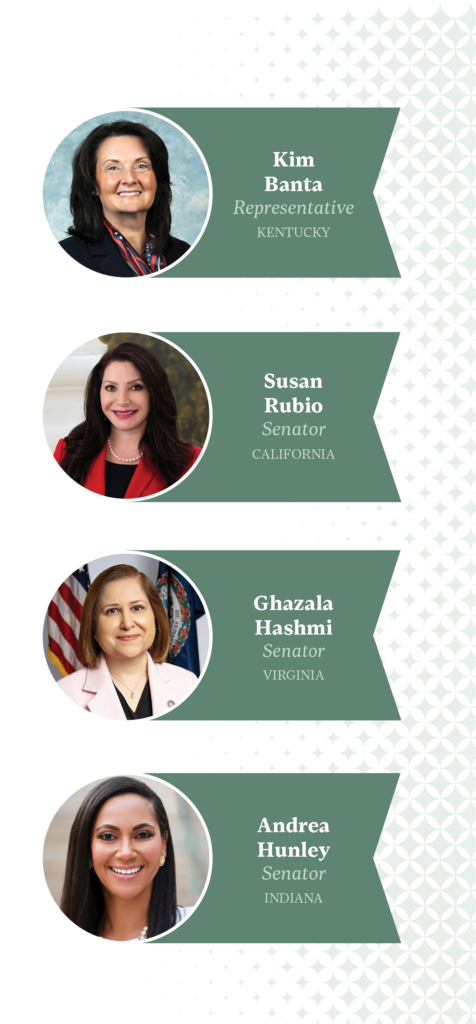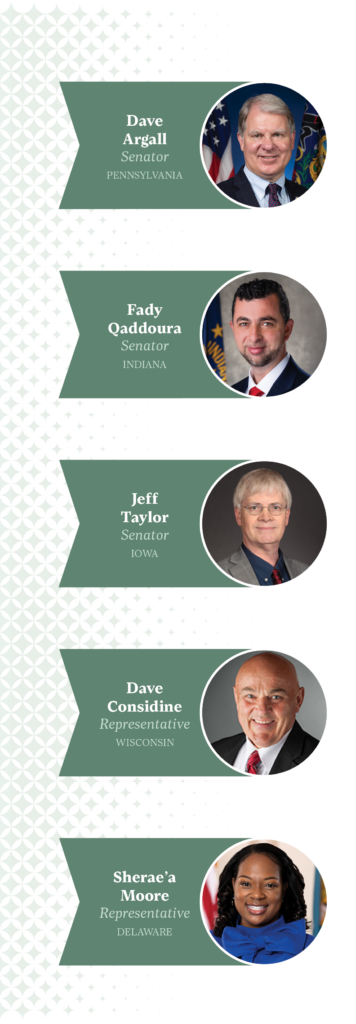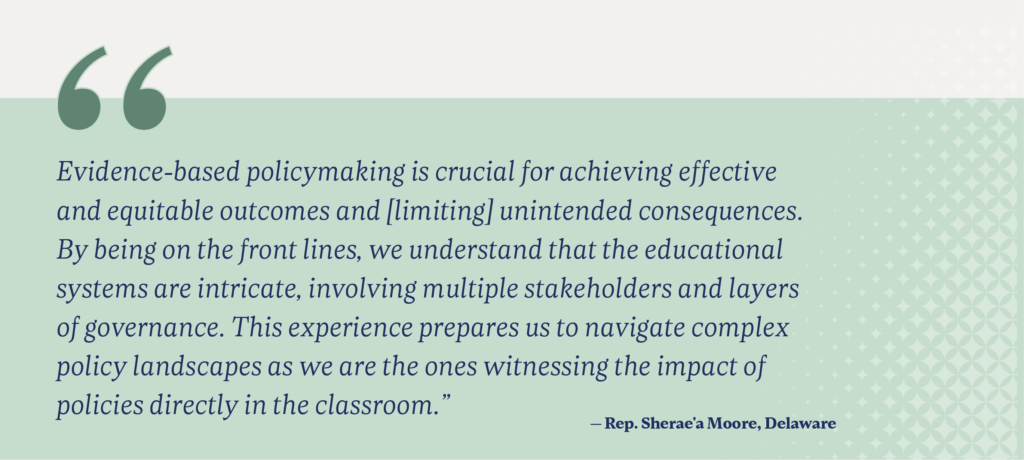Elected educators’ policy work places students first
By Maggie Mixer and Abeer Sikder
From classrooms to Capitols, a nationwide community of state leaders serve as educational advocates on their chamber floors. They drew inspiration from real-world experiences and outstanding students that left lasting impacts during their previous — and even ongoing — careers as teachers, professors and school administrators.
Despite having a diverse set of backgrounds and experiences, the policy work of nine state legislators is rooted in one common cause: students.
Kentucky Rep. Kim Banta, a former teacher, principal and assistant superintendent, noted that educators are deeply in touch with their communities and the day-to-day challenges faced by students and their families.
“Teaching is an amazing boot camp for most other things that you can do in life that might be stressful or difficult,” Banta said. “[Educators] have their fingers on the pulse of what the struggles are, what problems people are having … because you see every single segment of society [in schools].”
The 17-year teaching career of California Sen. Susan Rubio went beyond the classroom, as she helped students and their families navigate housing and food insecurity, language barriers and more.
“As an educator, I was exposed to so many of the issues our community members were facing,” Rubio said. “Early on, a few families came to me for support and help outside the classroom, letting me know they didn’t have funding for supplies … and I would try to connect them with [other] resources [too].”

Rubio said soon after she learned the true scale of the problem “and, as a teacher, [she] could only do so much.” Rubio decided she wanted to help her community from a broader platform. With access to more resources, she launched her first political campaign. Prior to joining the California Senate, she served Baldwin Park, California, for 13 years as a city clerk and city council member.
Other state leaders, such as Virginia Sen. Ghazala Hashmi, were driven to run for office due to specific challenges experienced in the classroom as an educator. Hashmi, who was professor at Reynolds Community College in Richmond, Virginia, also founded the college’s Center for Excellence in Teaching and Learning. After teaching for nearly 30 years, she put her name on the ballot because she “saw the state government pulling funding and resources away from students and families, and [she] knew that we could do better for thousands of deserving students.”

Current and former students have been a continuous source of inspiration for these elected officials. While most gave up being full time educators to hold elected office, many still teach part time or make guest appearances at their district’s schools and agree that it remains one of the best parts of their jobs.
Indiana Sen. Andrea Hunley, who taught high school English before her 10 years as a principal, recounted being inspired by students organizing against gun violence, high schoolers’ talented navigation of artificial intelligence programs and a third-grade class’s sit-in protest for more recess time. According to Hunley, students’ creativity and enterprise are “leaps and bounds ahead of us” and ahead of the legislation currently in place.
Hunley’s experiences drove her not only to serve as an elected official but to also always focus on creating broad and innovative policy because “we’re legislating for the future and for future generations.”
“It’s like our legislation never caught up to where our kids are,” Hunley said. “If we legislate in a way that we think like teachers … we plant seeds for today so that they can bloom tomorrow. We would legislate very differently as we think about generational impact, which is what teachers do every single day.”
Once elected, many of these legislators continued to draw substantive lessons, as well as inspiration, from their time as educators. Among the most important skills, though, was interacting and communicating with others in an effective manner.
Hashmi compared serving constituents and students, discussing the importance of being “timely, responsive and informed about how to resolve constituent concerns.” She added that it has improved her ability to engage with colleagues as she strives to “focus on the nuances of arguments” and “bring as much background and information as [she] can to influence the understanding of others.”
Pennsylvania Sen. Dave Argall took a unique path compared to most other legislators, entering elected office before becoming an educator. While serving in the Pennsylvania House of Representatives and later in the Senate, he took night classes for 13 years to earn his master’s degree and doctorate in public administration.
As an instructor, Argall returned to teach night classes as a state and community college instructor. It was there he acquired the ability to concisely present complicated issues to his constituents.
“When you’re meeting with college students one night a week for 15 weeks, you learn how to condense a lot of information.” Argall said. “I think that practice has been really helpful to me [when] meeting with constituents at town hall meetings.”
Listening respectfully is another side of communication legislators learned from their classroom experiences. Indiana Sen. Fady Qaddoura teaches courses on civic engagement and executive leadership as an adjunct faculty member in Indianapolis. In his experience, receiving critique on projects in academia as a doctoral student and researcher taught him the important role that diverse perspectives play in the process of creating high-quality work.
“[This perspective] helps us build bridges of trust among legislators to understand that when we raise a question or concern, it is not politically motivated,” Qaddoura said. “It comes from a genuine concern about the policy that is being debated or discussed.”
Qaddoura’s approach helped shape how he interacts with other senators and last year contributed to colleagues nominating him for the Indiana Senate’s annual civility award.
Similarly, Iowa Sen. Jeff Taylor — even as a member of a majority caucus — said he works to listen to everyone on the Senate floor. After many years as a professor, academic and author, he believes that there is always more to be learned from others.
“I make it clear [to students] that they’re free to disagree if they don’t see things the way I see it; I’m not going to hold it against them,” Taylor said. “I think I borrow that approach of fairness and objectivity from the classroom while on the Senate floor and in committee meetings.”
Rubio found that her experiences listening to and balancing the different perspectives of 30 students in a classroom greatly informed her ability to “create policy that’s sensitive to everyone’s needs.” In a large, diverse state like California, this crucial skill has helped her understand where her community fits in massive, statewide bills.
Many legislators who held administrative positions, like principals and superintendents, reflected on how listening was one of many skills they learned as educators that improved their ability to collaborate, especially with colleagues across the aisle. Banta and several of her colleagues with backgrounds in education work hard to build consensus, which she attributed to their experiences in education environments where “it was never my way or the highway.”
“We [educators] tend to listen a little bit better and we tend to be problem solvers and we try to get everybody on board,” Banta said. “You always have to work with people and come to some kind of consensus [as a principal] and I think that transfers right into this job.”

Wisconsin Rep. Dave Considine described how the goal of educational environments and improvement, not perfection, informed his approach to collaboration. Considine, a special education teacher for nearly 30 years, credits the patience he has brought to the Legislature for enabling him to stay focused on moving forward — no matter how slowly.
“[Politics can be] a step forward, then maybe a step or two back, and then another big step forward, and then maybe half a step back,” Considine said, drawing parallels to his teaching tenure. “You don’t change behaviors overnight. That was my specialty, and so I’m used to that.”
For many legislators, education offered an avenue to acquire strategies now utilized for policy development. Curriculum development is among those strategies. Often data driven, this specific process is one that helped prepare many of the nine legislators for life in office.
According to Delaware Rep. Sherae’a Moore, a former English teacher, data-driven curriculum development “translates well into the legislative process.”
“Evidence-based policymaking is crucial for achieving effective and equitable outcomes and [limiting] unintended consequences,” Moore said. “By being on the front lines, we understand that the educational systems are intricate, involving multiple stakeholders and layers of governance. This experience prepares us to navigate complex policy landscapes as we are the ones witnessing the impact of policies directly in the classroom.”
Moore has integrated this approach into her work in the statehouse by using “data to drive any type of decision making, before [she] even drafts legislation,” to ensure that the policies she proposes fit the needs of her constituents.
Educational experiences can also form legislators’ outlooks on the connections between different issues. Argall described sharing the view of his predecessor — another long-time educator — on the “spaghetti bowl theory of government” that “everything is related to everything.”
For Argall, the perspective of his predecessor impacted his approach to identifying and creatively addressing problems. In 2003, After seeing the “very tight correlation” between the availability of good jobs and a community’s education level as a community college instructor, he organized the conversion of an abandoned junior high school into a community college center.
“The building had been around since, I think, the 1920s, and was just sitting kind of sad, empty and beginning to deteriorate,” Argall said. “Sometimes in this job, you just need to bring the right people to the table.”
Through the combined efforts of the community college, the local government, Argall’s office and a private foundation, they not only converted the building into a new education center but also funded the incoming class’s tuition.
“I can still see the faces of the parents when [former Pennsylvania Gov. Mark Schweiker] made the announcement about free tuition for two years,” Argall said. “The parents understood the power of that moment and we literally changed lives that day.”
The project helped “breathe new life” into local students’ futures and the surrounding community, a central goal of Argall’s efforts around Pennsylvania, which have also included a series of anti-blight laws.
The transition from education to elected office was not necessarily a career switch for these nine legislators. Rather, it presented a new side of the same path of service that they were already walking. Education placed them on the front lines of their communities and helped teach them how to effectively work with and for others — lessons that they have brought into elected office to continue to serve current and future generations.
“We give that level of support to our kids because we genuinely, and in a loving and compassionate way, want our kids to be better than us,” Qaddoura said. “Imagine if you can extend that feeling — to give them the best of who you are so that they can live better lives — to the rest of the population and to your fellow citizens.”


